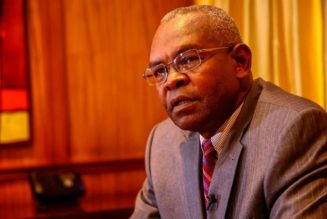Economy
Transport paralysed as PSVs strike
Wednesday July 12 2023
Matatu operators enjoy a game at the Nyeri main stage during the public service vehicles strike on July 12, 2023. PHOTO | JOSEPH KANYI | NMG
Transport remained disrupted in many parts of the country as matatu operators and other public service vehicles (PSVs) made good on their threat to stay off the roads due to the planned mandatory re-testing of drivers.
This forced many commuters to brave the cold morning to walk to their places of work.
In Nyeri, the town’s three main bus stations remained deserted as PSV operators heeded the strike call.
Stranded passengers at the Nyeri matatu stage on July 12, 2023.
Matatu touts and drivers drove around the town, chasing away the few who were operating.
A matatu driver, Onesmus Githinji, said they would not allow some of their colleagues to continue working while they were on strike.
“Fuel prices affect all of us. If there is a strike, we should all go on strike. No one should benefit at the expense of others,” said Mr Githinji.
However, most shops in Nyeri town remained open as the region, which is seen as Deputy President Rigathi Gachagua’s base, joined the protests against the high cost of living.
PSV vehicles parked on the streets of Elburgon town in Nakuru County on July 12, 2023.
In Bomet town commuters were hardest hit as they were forced to walk in the morning drizzle.
For the first time since the demonstrations began, public transport in Bomet was affected on Wednesday, with the main bus terminus deserted.
The main matatu stage in Bomet was deserted on Wednesday morning
Matatus were withdrawn from the Bomet-Narok-Nairobi highway, Bomet-Kaplong Kisii highway and Kericho highway for fear of being attacked by protesters and also to strike over the new rules by Transport Cabinet Secretary Kipchumba Murkomen.
In Kericho, the same scenario prevailed as matatus were withdrawn from the Kericho-Kisumu, Kericho-Nakuru and Kericho-Kapsabet-Eldoret highways.
In Nyandarua, most of the Nairobi-bound public service vehicles remained parked at the main Ol Kalou stage and on the streets, with the termini deserted by matatu crews and passengers.
John Karanja, a driver, said on normal days, about ten matatus leave Ol Kalou for Nairobi by 8am when the stage opens, but on Wednesday morning, only two had left for the capital.
“The drivers and passengers are afraid that the situation in Nairobi will be bad because of the demonstrations. We also support the strike, the cost of fuel is unaffordable for many passengers. We have seen a drop in the number of passengers going to Nairobi since the fuel price hike, we have more parcels than passengers,” said the driver.
But a Nation spot check found some matatus operating to and from rural areas and between Ol Kalou, Nyahururu and Kinangop areas.
Some matatu operators said they were ready to return to work but feared being attacked by their striking colleagues.
In Mombasa, residents were forced to walk to work after matatu operators grounded their vehicles.
There were long queues at most bus stops, with some private vehicles taking advantage of the situation to charge commuters to different parts of the island.
In the Bamburi area, however, some matatus were operating as usual, although there were no school buses, which are a common sight in the early hours of the morning.
In Kisauni’s Bakarani area, youths fought running battles with police as they tried to block roads.
Police were forced to fire into the air to disperse the protesters. Four were arrested.
A small crowd had gathered in the city’s Mapembeni area by 9.30 am in preparation for the protests. Shops were open as usual at 8am.
Truckers also stayed off the Northern Corridor, affecting the transport of export goods from Mombasa.
In Voi, matatus operated as normal.
In Voi town, it’s business as usual on July 12, 2023.
In Kisumu, a few matatu operators woke up to make a killing by taking passengers to their destinations before the demonstrations began.
While most also heeded the call for an industrial strike, only a few decided to collect the few coins before chaos rocked the lakeside town.
Many of them plying the Kondele-Lolwe-Carwash, Kibos-Town Service route ferried women going to the famous Kibuye Market to open their businesses, while those from Kisumu Main Bus Park to Nyamasaria and Ahero also operated.
But by 9am the roads were blocked and tyres lit, and all vehicles had returned to their various car parks.
Taxis were also away from their usual parking areas in downtown Kisumu and other areas in Kondele.
Kisumu’s main bus terminal also remained a ghost centre with no vehicles.
With many shops closed, there was limited movement of people as locals stayed away from their shops and children did not report to their schools.
In Kisii, Homa Bay and Siaya, there was not a single matatu on most roads by 10am on Wednesday.
Most vehicles were parked at the main bus park and travellers had to rely on motorcycles to get from one place to another. Motorcyclists took advantage of this and doubled fares.
Samson Okong’o Mose, president of the Kisii Matatu Workers Union, blamed the authorities for making drivers undergo refresher courses.
“I have been a bus driver for 15 years and the National Transport and Safety Authority (NTSA) suddenly wakes up from nowhere and forces us to do refresher courses that are so humiliating. We will not accept that at all,” said Mose.
He also lamented the government’s decision not to recognise the district transport committees they had formed to represent their interests.
Reporting by Lucas Barasa, Vitalis Kimutai, Waikwa Maina, Robert Kiplagat, Eric Matara, Lucy Mkanyika, Kevin Odit, Wachira Mwangi, Brian Ocharo, Philip Muyanga and Rushdie Oudia and Wycliffe Nyaberi









